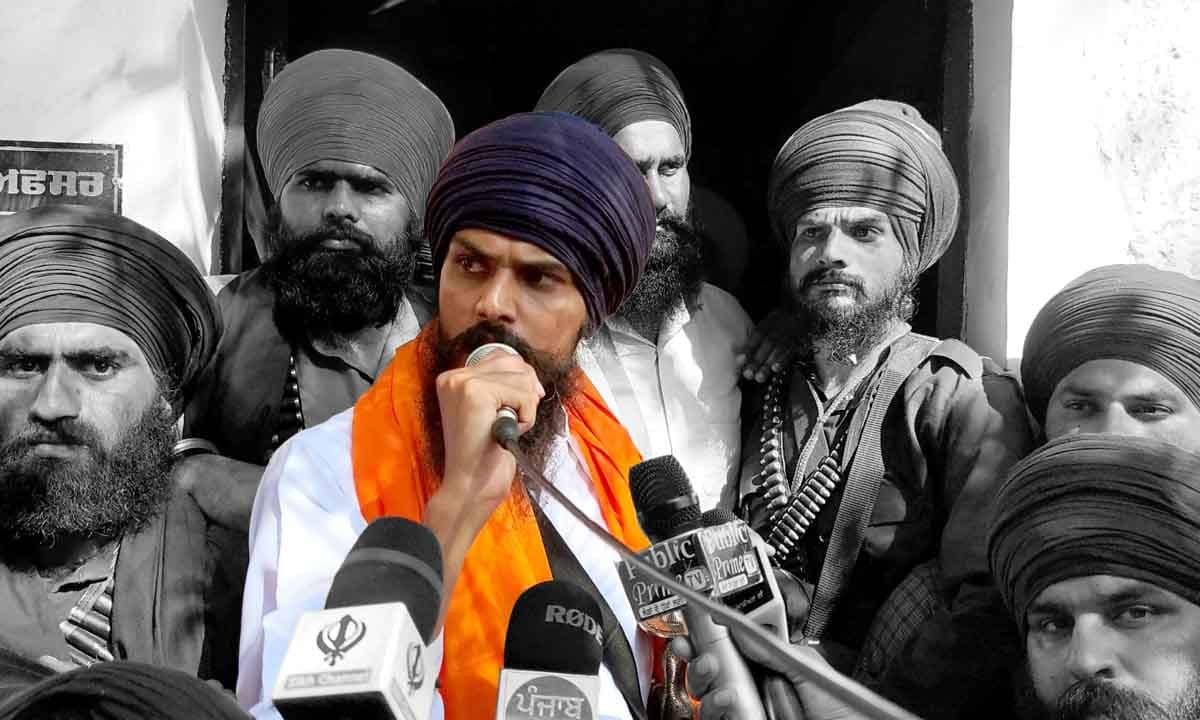
Amritpal Singh, a 28-year-old, not only resembles Jarnail Singh Bhindranwale in appearance but also in speech. On March 18, the Punjab Police launched a crackdown against Waris Punjab De, arresting 78 people and detaining several others for questioning. Amritpal Singh was reported to be escaping. He has big fan-falls across Punjab and overseas countries. Some of the hard-core Punjabis believe that Amritpal Singh is fighting for the rights of Punjabis and Sikhs. His arrest is seen as deliberate propaganda to delegitimize and discredit his demands. A fight for justice and human rights is being deliberately painted as a separatist movement.
Almost every Hindu who is radical on social media openly calls for a Hindu nation, so are they separatists and extremists for attacking secular principles and threatening minorities? Is India a Hindu nation solely based on the majority religion of its people? The Constitution of India says one can support a personal stance, be it an independent nation, but shouldn’t do any violence. The history of Kashmir, Sikkim, Punjab, and Junagarh as provinces is such that they justified separatism to some extent in the past, present, and future, though separatism is never justified if it gets violent and can lead to bloodshed in a particular society.
Before 1947, Sikhs initially proposed Sikhistan, though it was rejected by Sikh leader Tara Singh Malhotra on the advice of Nehru and Gandhi, with Baldev Singh given defence ministry. The word Khalistan was itself coined by Jagjit Singh Chouhan (a former Congress member who later resigned). Amritpal Singh is new blood; he is still carried away with the concept of having a separate Khalistan. He believes that the Sikhs are still slaves in their own country. There is anger, denial, and dissension; these young Sikhs need to be given a sense of belonging and confidence. Just arresting them and hounding them will not solve the purpose.
He spoke against Christian missionaries converting low-class Sikhs and Hindus in villages, which is a valid point. For this, he got support from many Hindus as well, though unlicensed Shiv Sena in Punjab, particularly Amit Arora in Ludhiana, objected to it as well. Many Sikh-born Christians converted to Sikhism and came back to their roots. Nowadays, villagers object to building churches in their villages because it creates superstitions like exorcisms, blind men having vision, and dumb and deaf people speaking and hearing, which are commonly used by pastors. More than 8% of Sikhs came back to their roots and said they were lured and given money or financial aid when Sikh committees failed.
Later, he spoke against Deras, who not only lured backward Hindus but also backward Sikh classes, which is also a valid point. He’s against Dera Sacha Sauda Sirsa, and all those deras, such as Derawaad or the priesthood, are contradictory to Sikh ideology. He got support in this regard from many Sikhs and even some Hindus. He was vocal about Sikhs going into drug use; he made many speeches and attempts to bring these drug addicts into the mainstream. For this, he got support from many local Hindus.
Then he started expressing his support to separate Khalistan; he got support from many Sikhs on social media but no Sikhs in real life because he was labeled as a separatist. Though he never explicitly stated it, when asked about Khalsa Raj, he openly supported it. Khalsa Raj meant a Sikh nation or sovereignty. He uses words likeHukumat,” which means “government in power,” which is most common for him, when addressing any policies of the government that he thinks are wrong against Sikhs. He toured many villages, telling people to stop propagating Sikhism. This young man definitely has some good objectives for Sikhism.
T-shirts and even vehicles with Bhindranwale’s photographs are a common sight in Punjab. Two ubiquitous photographs seen across Punjab are those of Bhindranwale and Bhagat Singh. In 2003, the Akal Takht declared Bhindranwale a “martyr” of the Sikh community, and his photograph is displayed. On display in the Central Sikh Museum, which is part of the Darbar Sahib Complex in Amritsar, “all is not black and white.” If some Sikhs remain critical of Bhindranwale, some Hindus too want a nuanced understanding.
Kharar resident Navdeep Gupta even filed RTI applications to ask if Bhindranwale was mentioned as a “terrorist” in police records or if there was any FIR registered against him before Operation Blue Star. After getting negative replies, he made his point. While some of his TV interviews are already available, Bhindranwale’s supporters often refer to these to drive home their point on April 23, 2016.
Sant Bhindranwale was born in the village of Rode, in the Faridkot District of Punjab. His father, Joginder Singh, was a farmer and a local Sikh leader who had one daughter, Manjeet Kaur, and seven sons, of which Jarnail Singh was the youngest. Jarnail Singh was brought up as a strict vegetarian. His six brothers were Jagir Singh, Jagjit Singh, Jugraj Singh, Harjeet Singh, Veer Singh, and Captain Harcharan Singh.
Sant Gurbachan Singh Khalsa Bindrawale was the 12th Jathedar of the Taksal. Under his guidance, Sant Jarnail Singh began a year-long course in spiritual, scriptural, theological, and Sikh historical studies. A year later, Sant Jarnail Singh went back to his village and returned to farming. In 1966, he was married to Bibi Pritam Kaur, the daughter of Bhai Sucha Singh of Bilaspur. His wife bore him two sons, Ishar Singh and Inderjit Singh, in 1971 and 1975, respectively. The successor to Gurbachan Singh Khalsa, Kartar Singh Khalsa, who died in a road accident on August 16, 1977, mentioned Bhindranwale as being the new leader of the Damdami Taksal. Sant Bhidranwale was formally elected at a bhog ceremony at Mehta Chowk on August 25, 1977.

